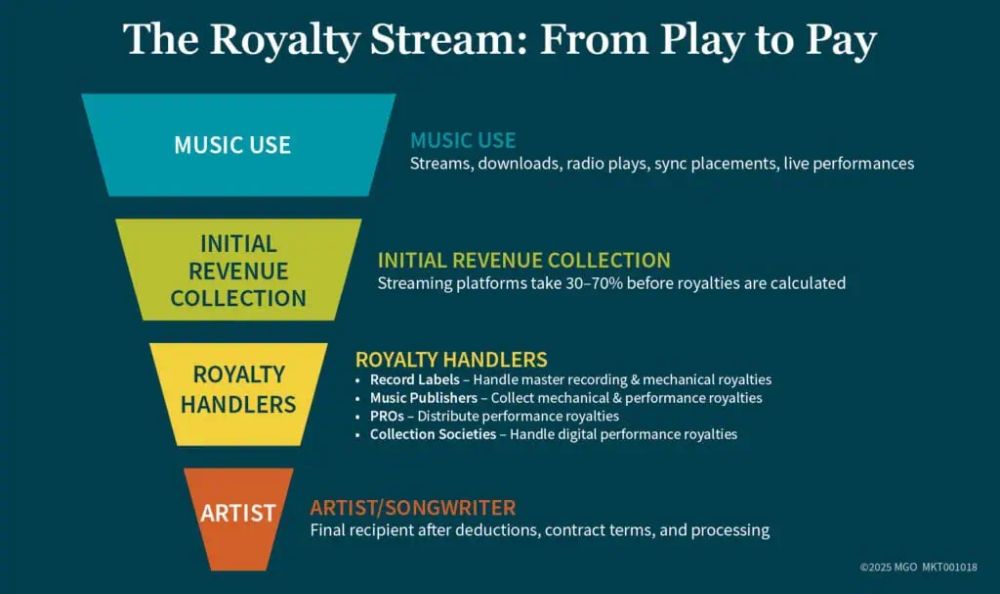- within Media, Telecoms, IT and Entertainment topic(s)
- within Government, Public Sector and Real Estate and Construction topic(s)
- with Finance and Tax Executives
- with readers working within the Accounting & Consultancy industries
Key Takeaways:
- The modern music royalty system is complex, with money flowing through multiple channels and entities before it reaches you.
- Missing income often results from untracked royalties, inaccurate reporting, and opaque accounting across streaming, publishing, and performance sources.
- Independent royalty accounting helps you track every dollar, uncover underpayments, and make informed career and business decisions.
—
If you're a music artist today, you're navigating one of the most intricate financial landscapes in the entertainment industry. From streaming platforms and sync licensing to mechanical royalties and performance rights, your music generates revenue through countless streams — and, unfortunately, money often gets lost along the way.
How Music Royalties Actually Work
Your music doesn't just make money one way. Every time someone streams your song, buys a download, plays it on the radio, or uses it in a TikTok video, different types of royalties are generated:
- Mechanical royalties kick in when your music is reproduced — whether that's a physical CD or vinyl, a digital download, or a stream. In the U.S., you're looking at a certain rate per song for physical sales and downloads, while streaming rates vary widely by platform.
- Performance royalties flow when your music is played publicly. Radio, TV, live venues, streaming services — all generate performance royalties that should find their way back to you through performance rights organizations such as the American Society of Composers, Authors and Publishers (ASCAP), Broadcast Music, Inc. (BMI), or the Society of European Stage Authors and Composers (SESAC).
- Synchronization royalties come from your music being placed in films, TV shows, commercials, or video games. These can be significant payouts, but they require proper tracking and clearances.
- Master recording royalties go to whoever owns the actual recording — ideally you, if you're independent, or your label if you're signed.
The Many Hands in Your Royalty Stream
Here's where it gets complicated. Multiple entities handle different pieces of your royalty pie:
- Streaming platforms like Spotify, Apple Music, and YouTube Music take their cut first — typically keeping 30-70% of subscription and ad revenue before any money flows downstream. What's left gets distributed as royalties.
- Record labels collect master recording and mechanical royalties from sales, then pay you based on your contract terms — usually after recouping their advances and expenses.
- Music publishers collect mechanical and performance royalties for songwriters, taking their cut (typically 15-25%) before paying out.
- Performing rights organizations (PROs) monitor public performances and distribute performance royalties.
- Collection societies like SoundExchange handle digital performance royalties from streaming and satellite radio.
Each of these players operates on different timelines, uses different accounting methods, and reports to you or your label separately. It's like trying to conduct an orchestra where every section is playing from a different sheet of music.

Why It's Hard to Know if You're Getting All Your Royalties
Even with honesty, the system is built for complexity, not clarity. You face challenges like:
- Rapidly evolving royalty streams: From streaming and sync to NFTs and user-generated content, revenue sources keep multiplying.
- Global complexity: Different territories have unique licensing rules and collection processes.
- Opaque accounting: Royalty statements can be dozens of pages of unclear line items, lump sums, and deductions.
- Cross-collateralization: Labels sometimes pool revenues and expenses across multiple albums, hiding the true performance of a single project.
Common causes of missing or reduced royalties include incorrect song registrations, wrong International Standard Recording Codes (ISRCs), improper royalty rates, unclaimed checks, and publishers failing to collect from all sources.
Why Verification Is Nearly Impossible on Your Own
Streaming platforms, labels, and publishers have access to data you don't — like exact stream counts per territory and per rate tier. Even if you get reports, they often lack enough detail to verify accuracy.
A single song could be generating money through Spotify, YouTube, international radio, sync licenses, and more — all reported on different timelines, in different formats, and with different rates. Without industry-specific accounting knowledge, spotting discrepancies is nearly impossible.
How Independent Royalty Accounting Protects You
Independent royalty accounting gives you an unbiased, artist-centered view of your income. It's about tracking every dollar your music earns, identifying underpayments, and making sure the money reaches you.
An independent accountant or auditor can:
- Analyze contracts to confirm correct royalty rates are applied
- Audit statements to spot missing income or improper deductions
- Track royalties across all platforms — streaming, publishing, sync, international
- Recover unpaid or overlooked back royalties
- Forecast income and value your catalog for future deals or sales
Why It Matters for All Artists (Not Just Superstars)
You don't need to be a stadium-filling artist to benefit from independent royalty accounting. In fact, indie and mid-level artists often lose the highest percentage of income to untracked royalties because they don't have the in-house teams that major-label stars do.
Royalty accounting also helps you make smarter career decisions — whether it's knowing which platforms generate the most income, which territories you should focus on, or whether a publishing deal offer is truly worth it.
The content of this article is intended to provide a general guide to the subject matter. Specialist advice should be sought about your specific circumstances.


